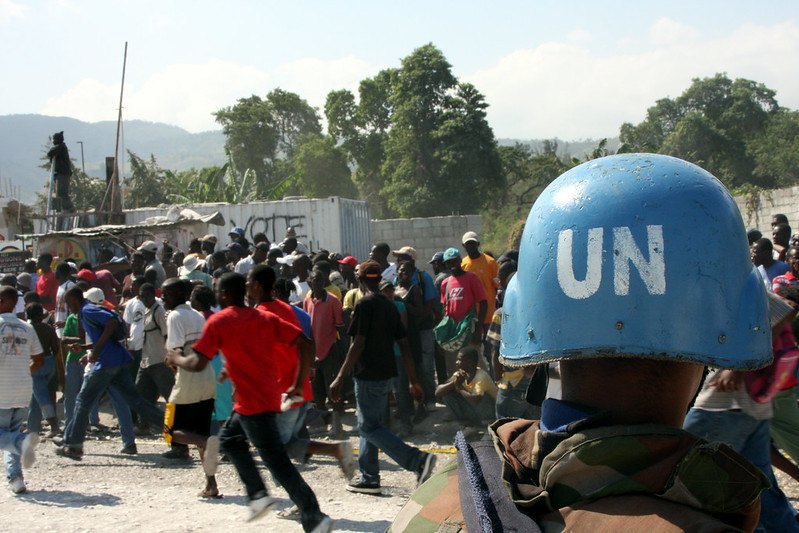Mark Martins Speech at Harvard
Last Monday Harvard Law School conferred its medal of freedom on one of its graduates, General Mark Martins, Commander of the Rule of Law Field Force -Afghanistan. The Harvard National Security Journal has just posted the speech, with slides, that General Martins gave for the occasion. It is a terrific speech, covering a wide range of issues of interest to readers of this blog, including ho
Last Monday Harvard Law School conferred its medal of freedom on one of its graduates, General Mark Martins, Commander of the Rule of Law Field Force -Afghanistan. The Harvard National Security Journal has just posted the speech, with slides, that General Martins gave for the occasion. It is a terrific speech, covering a wide range of issues of interest to readers of this blog, including how law operates in military operations on the ground, military justice issues in Iraq and Afghanistan, the role of money in counterterrorism operations (and how legal guidance helps legitimate that role), and, most extensively, the relationship between law and counterinsurgency theory and practice, with special reference to Afghanistan.
To give a flavor, here is a snippet from the introduction:
The case I will briefly sketch here today is this: your Armed Forces heed and have continued to heed the law, take it seriously, and in fact respect it for the legitimacy it bestows upon their often violent and lethal — necessarily violent and lethal — actions in the field. Furthermore, a conscious and concerted reliance upon law to defeat those inside and outside of government who scorn it happens to be good counterinsurgency. Efforts to promote the rule of law must be only part of a comprehensive counterinsurgency campaign and must be focused upon the building and protection of those key nodes and institutions — formal and informal — upon which the authorities’ legitimacy depends. Great care must also be taken to preserve the initiative of the individual troops who continue to shoulder the most dangerous and significant burdens of this decentralized conflict. But if prosecuted effectively within these ground rules, such efforts may well prove decisive.And here are two of the speech’s five “concluding observations”:
Third observation — in all of the examples, we had lawyers deployed with us who could help. I have not come close to exhausting all that operational lawyers must be, know, and do in modern U.S. military operations. They must be soldiers — physically fit to endure the rigors and stresses of combat while keeping a clear head, as well as able to navigate the area of operations, communicate using radios and field systems, and, when necessary, fire their assigned weapons. They must also be prepared, when called upon, to foster cooperation between local national judges and police, to plan and supervise the security and renovation of courthouses, to support the training of judges and clerks on case docketing and tracking, to establish public defenders’ offices, to set up anti-corruption commissions, to mentor local political leaders and their staffs, to explain governmental happenings on local radio and television, to develop mechanisms for vehicle registration. Because of their work ethic, creativity, intelligence, and common sense; because of their ability to think and write quickly, persuasively, and coherently; and because of their talent for helping leaders set the proper tone for disciplined and successful operations—I and other commanders tend to deploy as many field-capable lawyers as we can. The number of judge advocates in the 101st Airborne Division reached 29 under General Petraeus’s command. At the Multi-National Force-Iraq, a force of about 160,000, we had 670 uniformed legal personnel, including 330 operational lawyers — several of whom were great British and Australian judge advocates — and 340 paralegal specialists and sergeants. In Afghanistan, we have nearly 500 judge advocates and paralegal specialists. . . . [F]ifth and concluding observation. Rule of law in Iraq and Afghanistan remains mostly just a goal, but also an indispensable one. And in the context of Afghanistan, where my own experience is freshest and therefore this one Harvard Law Grad is more confident in my assessments, the challenges are very practical ones. There is much talk about whether the gains of the troop uplift ordered by the President at West Point in 2009 are sustainable. Simply put, this Grad’s view is that the emplacement and transitional support of relatively small numbers of Afghan government officials at the provincial and district level is key to sustaining recent security gains and transferring security responsibility. We need to assist committed Afghans in fielding a network that surpasses what is a very real — if complex and multi-aimed — network opposing them. The resulting improvements in district governance can help displace the Taliban and prevent their return by offering less arbitrary dispute resolution and dispelling fear among the population. These efforts are modest in cost, and the improvements are achievable and sustainable. Anyone who has seen the district governors, police chiefs, and prosecutors in Khost City, Zheray, Arghandab, and Nawa help transform those places from active combat zones into places where Pashtuns are shouting and squabbling over civil claims rather than shooting and planting bombs, knows the force of this observation. The strengthening of traditional dispute resolution at the local level is one of the most efficient and effective ways to achieve the kind of security and stability that can enable transition of responsibility to the Afghan government and its forces, and protect our own core national security interests.
Jack Goldsmith is the Learned Hand Professor at Harvard Law School, co-founder of Lawfare, and a Non-Resident Senior Fellow at the American Enterprise Institute. Before coming to Harvard, Professor Goldsmith served as Assistant Attorney General, Office of Legal Counsel from 2003-2004, and Special Counsel to the Department of Defense from 2002-2003.




.jpg?sfvrsn=104df884_5)
